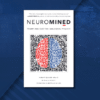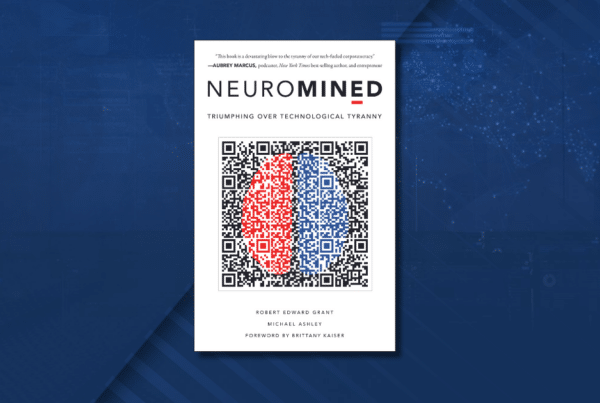
An article by Michael Ashley and Robert Edward Grant (Crown Sterling Founder & CEO) in promotion of their upcoming book Neuromined: Triumphing over Technological Tyranny (Fast Company Press 2023)
Keri Wells struggled with finances all her life. So did her parents. As far back as she could recall, there was never enough to buy clothes for school. Or supplies. Even scraping together lunch money was often an ordeal.
Though she vowed to not make the same mistakes when she became a mom, old habits die hard. Keri never could hold down a job long. She barely saved money and frequently received notices from angry creditors, threatening to shut off her power or her account(s) for non-payment.
So when the government announced an “economic jubilee” she was overjoyed. All her debts would vanish overnight. Even better, she would receive universal basic income (UBI) in the form of a $3K monthly electronic deposit.
Only things didn’t go so well for Keri.
Months after signing her lengthy UBI agreement, she received this disturbing phone alert: “Your stipend is being reduced by $1K this month for climate non-compliance.”
Huh?
Keri did some digging. She discovered the agreement she signed mandated she abstain from using any gas-powered cars. Local traffic cameras in her city had scanned her plates and matched her registration.
Keri didn’t want to give up her VW bug. It had sentimental value. Her financially strapped dad had bought it for her upon graduating college. Plus, she loved driving it.
But $1K is a lot of money. So, she switched to riding the bus. This “helpful climate action” as the government deemed it, bumped up her stipend to a cool $4K.
Not bad.
But the next year, Keri received yet another warning. This one hurt. Because she “defied” climate compliance, her stipend was put on pause.
Her crime? She arranged for a picnic at a park with some other families to celebrate her daughter’s 4th birthday.
How did they know? She wondered.
Turns out, drones flying so high she couldn’t see them had surveilled the movements of everyone in her subdivision to detect anyone breaking carbon lockdown orders issued that Fall by her governor.
By now, Keri had had enough. I’m nobody’s slave.
It felt good to tell the government she’d no longer accept UBI payments—she was saying “no” to any more handouts.
She slept well that night.
But when she woke up, she received a frightening new phone alert. “By forfeiting future UBI deposits, all your previous debts have returned in full.”
Keri couldn’t believe the words she was reading.
Even worse, the existing money in her digital wallet no longer functioned. Anywhere. The government just canceled it.
Keri was on her own.
*****
Not long ago, the World Economic Forum (WEF) put out a bold video campaign with an image of a smiling young man and these immortal words: “You will own nothing and be happy.”
Most anyone who sees this video for the first time would be confused. How could it possibly come to pass that (1) no one would own property anymore and (2) they would be happy about it?
The very notion flies in the face of everything Americans have come to expect about our way of life. Yet what the WEF is proposing could very well come to pass if current downward economic conditions continue.
Already, countries—including the U.S.—are adopting Universal Basic Income, a social service model providing monetary funds to its citizens. In case you’re unfamiliar with the concept, here’s a brief primer from Investopedia:
Universal basic income (UBI) is a government program in which every adult citizen receives a set amount of money regularly. The goals of a basic income system are to alleviate poverty and replace other need-based social programs that potentially require greater bureaucratic involvement. The idea of universal basic income has gained momentum in the U.S. as automation increasingly replaces workers in manufacturing and other sectors of the economy.
If UBI truly catches on in the U.S. as some global business leaders, such as Mark Zuckerberg, have endorsed, we must be careful. There’s a reason why Claire Boothe Luce, playwright of The Women, debuting in 1936, and featuring an all-female cast once said: “A woman’s best protection is a little money of her own.”
Luce made these remarks at a time in which many women didn’t enjoy the same independence they do today. She knew quite well how not possessing financial means can disenfranchise a person—locking you out of society.
To this point, another way to think of UBI is like the carrot and the stick. The carrot? Free money from the government. Yay! The stick? The government can shut that money spigot off at any time, leaving you out in the cold. Anyone who doesn’t go along with the program can expect their funds to vanish. Or to no longer work, just like what happened to fictional Keri.
There’s a name for such a phenomenon: programmable money. And it’s coming to the U.S. if the World Economic Forum gets its way and abolishes physical cash. Here’s how James Corbett of The Corbett Report explains such tyranny:
…Programmable money could also be used to perfect a system of carbon credits and individualized ESG scores. In today’s world, it would be incredibly difficult for the government to implement a scheme where every store has to check your carbon allowance before allowing your next purchase. Sure, EBT cards can be programmed to disallow purchases from liquor stores, casinos, or other naughty businesses, but stopping people from spending their own bank deposits (or cash) is much trickier. In the CBDC world of the future, however, such restrictions could be programmed into the ledger itself. If your carbon credit or your ESG score is below a certain amount, no soup for you!
As we discussed back in October, ESG scores are (for now) the softer, Western version of the Chinese social credit system. Right now, ESG scores are used to control businesses under the carrot and stick model.
Given sufficient time—and insufficient pushback from the public—we can expect a day where private citizens are assigned social credit scores to reward or punish behavior. And as anyone who has kept up with China knows, it’s quite simple for such a system to lock people out of society this way.
These are precisely the types of concerns we raise in our forthcoming book Neuromined: Triumphing over Technological Tyranny (Fast Company Press, 2023). If you reject a world in which “you will own nothing and be happy”—we encourage you to share this article with everyone you know.
Resistance begins with awareness. Then action. It’s not too late.
About Crown Sterling Limited LLC
Leader in Data Sovereignty and provider of quantum-secure encryption, Crown Sterling empowers individuals and communities in an era of unregulated data consolidation, monopolization, and monetization by Big Tech. By leveraging next-generation encryption, blockchain technology, and decentralized digital transformation represented by Web3, we are committed to granting you complete control over your personal data and supporting the protection of free speech, assembly and choice.
The launch of Orion™ Messenger presents a quantum-secure end-to-end encrypted, uncensorable, and decentralized communications platform as a solution where sovereign individuals and communities can thrive. Unlike commonly used applications that rely on vulnerable encryption protocols, data mining practices, and other limitations, Orion is the only platform allowing for large encrypted group chat and social media communications in an unmonitored and uncensorable environment. Join the Orion Messenger waitlist.













